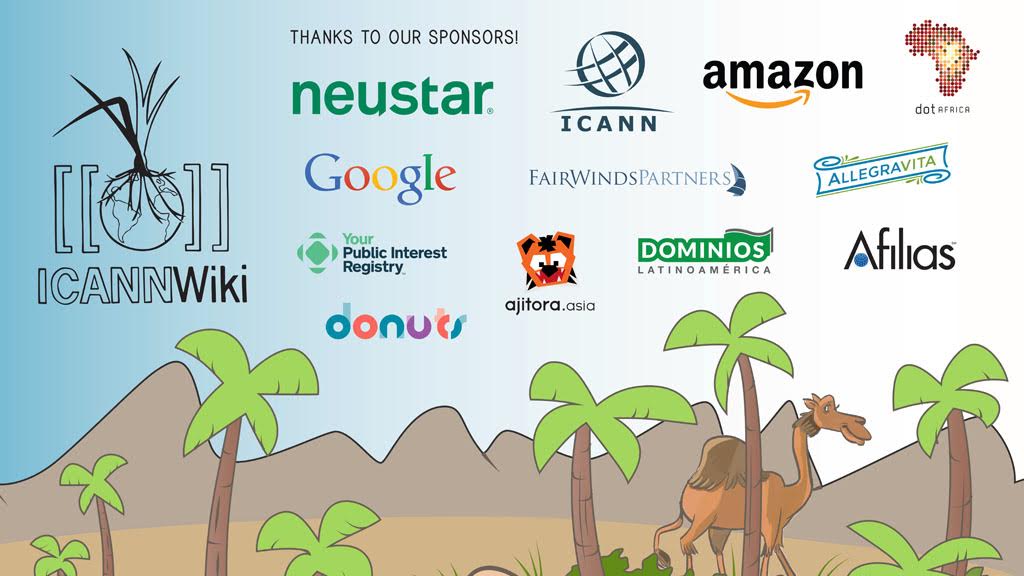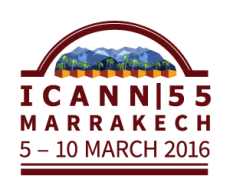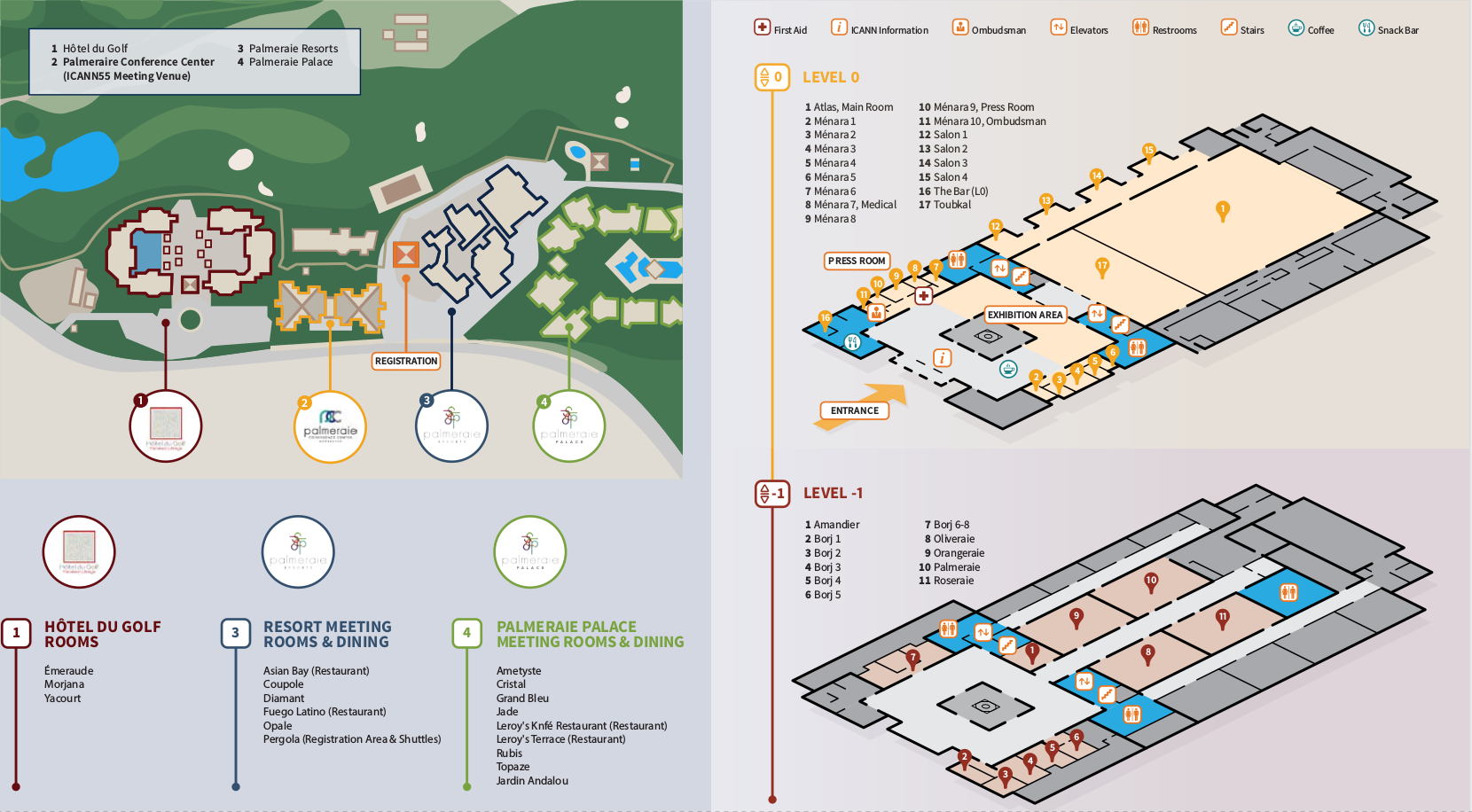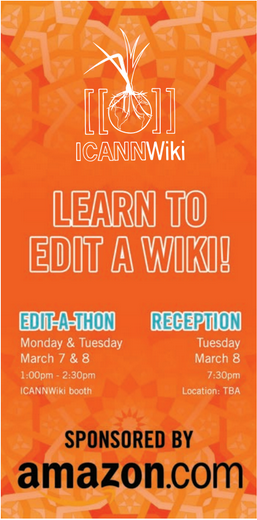Main Page
Whether you are attending in person or participating remotely, we are your one-stop shop for everything you will need over the next week. On our homepage, you will find everything ICANN 55. We have basic meeting details, a summary of important topics being addressed, a daily schedule and a list of expanded acronyms that you will need to know. While you are here make sure to check out our Special Tribute to Fadi Chehadé for his last meeting as ICANN President and CEO.
You may just want to make this your homepage for this next week, because you will be coming back frequently for information as you need it. There is a lot of information on this page, so everything expands and collapses on demand, so that you can open up information as you need it! If you want or need any more information than we provide on the homepage, you can search our 8,705 articles and you are sure to find what you are looking for, presented to you in an easily accessible format. You will find that this page is well linked so you should be able to go directly to the articles for topics you would like to learn more about.
If you have any questions or suggestions, stop by our booth and chat with Jackie and Dustin or email us: Jackie and Dustin. We are always accessible and eager to assist!
Fadi and the ICANN Oasis
While revisiting the beginning of Fadi's time with ICANN, we were particular inspired by his speech at ICANN 44 in Prague, before he even took on his role as President and CEO of ICANN, he understood to importance of making ICANN an environment suitable for engagement and progress. During this speech, he said that, "ICANN must become an oasis, a place that people see and come to because it works, because it makes sense, because it is efficient." On this note, it seems fitting that his final meeting is taking place in Morocco, home to a chunk of the Sahara Desert and numerous oases. We wanted to pay tribute to Fadi's time at ICANN with a mural that summarizes the work he has accomplished and all that he has done to make ICANN more of an oasis.
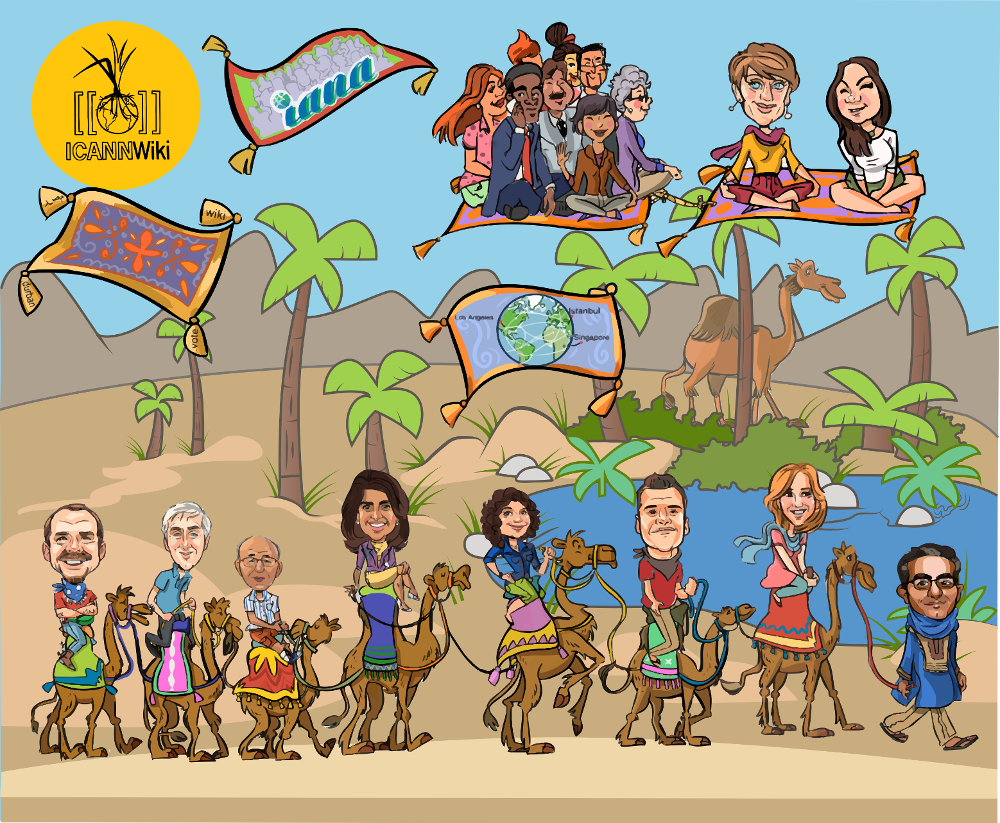
On the Camels (from left to right): Byron Holland, James Galvin, Tijani Ben Jemaa,Tripti Sinha, Faliz Yilmaz, James Bladel, Olga Cavalli
Magic Carpets Represent: IANA Transition, New gTLD Program, New hubs in Singapore and Istanbul, ICANN Fellowship and Next-Gen Programs
Fadi's Journey
On September 22, 2012, Fadi Chehade stepped into the role of President and CEO of ICANN, ushering in a “new season” of engagement, understanding, and cooperation for an organization facing the criticism of being too US-Centric. His diverse background and diplomatic prowess made him the perfect candidate to accomplish the ambitious goals of creating a truly global and operationally excellent ICANN. From the first time that Fadi addressed the multistakeholder community at ICANN 44 in Prague, he has emphasized that ICANN must not become a fortress, but rather an oasis.
From his introduction in ICANN 44 in Prague up to his final meeting at ICANN 55 in Marrakech, Fadi has been dedicated to promoting ICANN’s bottom-up, multistakeholder process. Fadi has played a critical role in some of the most crucial years in ICANN’s history. He stepped into his role in the early stages of the New gTLD Program, emphasizing operational excellence in the implementation this historical change to the Domain Name System. Under his tenure, also came the announcement that the U.S. Government intended to transition stewardship of the IANA Functions to the global multistakeholder community, nearing the culmination of the process dating back to the creation of ICANN in 1998. Needless to say, Fadi has been instrumental in some of ICANN’s most important moments, but arguably his most important contribution was transforming ICANN into a truly global organization and strengthening the multistakeholder model across the diverse spectrum of the ICANN community.
Fadi’s diplomatic strengths enabled him to engage the entire Internet community in a meaningful way, extending outreach to everyone from the individual Internet user to global leaders involved in a variety of Internet governance fora, including the IGF and the UN’s ITU. This leadership and outreach resulted in ICANN being invited to an ITU meeting for the first time. The strengthened relationships with organization like the ITU indicated a “new season of cooperation” among organizations perceived to be engaged in turf wars over Internet governance for years.
In addition to working with major organizations within the IG sphere, Fadi stressed the importance of engaging the global stakeholder community, making ICANN into more of the global entity that it was always meant to be. He helped “bring ICANN to the world, rather than asking the world to come to ICANN.” Within his first year, ICANN opened hubs in Singapore and Istanbul, and appointed four new VPs of Global Stakeholder Engagement to improve the international presence and participation in the regions of Africa, Asia, Eastern Europe and the Middle East.
To further engage and empower the global multistakeholder community the NextGen@ICANN program was created and the existing ICANN Fellowship Program was expanded from approximately 25 to 50 fellows per conference. These programs enable participants from developing countries to attend ICANN meetings and fully participate in the ICANN process, helping to bring a more diverse set of stakeholders to the decision making table.
With the help of a fantastic staff and executive team, Fadi has changed ICANN for the better, shifting the decision making process better reflect the all of the global stakeholders. Fadi’s dedication to globalising ICANN was even evident in the small things, like answering a question at the public forum in the Arabic. He brought an awareness to the diversity of ICANN’s stakeholders that ICANN had previously been missing and ultimately made it more of an oasis and less of a fortress.
Meeting Details
Location: Parc de la Palmeraie, Circuit de la Palmeraie, Marrakech 4000, Morocco
Remote Participation:Click Here
Venue Map
Edit-a-Thon
Key Topics
IANA Transition
In March 2014, the US Department of Commerce’s National Telecommunications and Information Administration announced its intention to transition the oversight role of the IANA Functions to the global multistakeholder community on 30 September 2015 (later extended to 30 September 2016). The announcement asked ICANN to initiate a multistakeholder process to develop a proposal to be submitted to the NTIA for approval. The proposal requires broad support and follows the following principles:
- Support and enhance the multistakeholder model
- Maintain the security, stability, and resiliency of the Internet DNS
- Meet the needs and expectations of the global customers and partners of the IANA services
- Maintain the openness of the Internet
In response, ICANN formed the IANA Stewardship Transition Coordination Group (ICG), made up of 30 members from 13 constituencies, to develop the structure and timeline for finalising the proposal, which requires proposals from the communities directly affected by the IANA functions. Each of these communities developed their own working groups to develop their proposal:
- The Numbering Resources Community, comprised of the Numbers Resources Organization (NRO), the Address Supporting Organization (ASO) and the five Regional Internet Registries (RIR) formed the Consolidated RIR IANA Stewardship Proposal Team (CRISP Team) to develop their proposal.
- The Protocol Parameters community, comprised of the Internet Engineering Task Force (IETF) and the Internet Architecture Board (IAB), formed the IANAPLAN Working Goup.
- The Domain Names community, developed two working groups the CWG-Stewardship and the CCWG-Accountability.
On 29 October 2015, the ICG announced that it had finalised all of the proposals from the community, except for the one from the CCWG-Accountability, which is currently in its final stages. If everything proceeds as planned the community will submit the final proposal to take over stewardship of the IANA functions on 10 March 2016, the last day of ICANN 55.
Enhancing ICANN Accountability
During initial discussions relating to the IANA Stewardship Transition, the ICANN community raised concerns about the impact that the transition would have on ICANN Accountability. In response, the Enhancing ICANN Accountability process was launched to develop a proposal, seeking to implement accountability measures that will hold ICANN accountable to the global stakeholder community in the absence of the “accountability backstop” provided by the historical contractual relationship with the U.S. Government. This proposal is the final piece of the IANA Transition puzzle and when submitted to the ICG will complete the proposal that the U.S. government asked for two years ago, in March 2014.
In December 2014, the CCWG-Accountability began working on the proposal to enhance ICANN Accountability. The process was divided into two Work Streams. Work Stream 1 is focused on accountability mechanisms that need to be in place prior to the transition. Work Stream 2 is focused on accountability measures that can be implemented post-transition. The CCWG identified four “building blocks” for the mechanisms that need to be in place pre-transition: Principles that form the Mission and Core Values of ICANN; Empowered Community; ICANN Board of Directors; Independent appeal mechanism;
After several iterations, the CCWG released its third draft proposal on 30 November 2015, which was the culmination of two prior draft proposals and almost a year of hard work. This third proposal set forth twelve recommendation for the accountability measures needed to enhance ICANN accountability.
The key elements of the third proposal include: Revised Mission statement for ICANN Bylaws, that clarifies what ICANN does but does change the scope of its mission of coordinating the Internet’s unique identifiers for the Internet. Enhanced Independent Review Process to ensure that ICANN stays within its mission. New community powers to be used to hold the Board of Directors Accountable.
Enforceability of the accountability measures will be supported by the creation of an “Empowered Community,” which will be granted the legal status of a Designator within ICANN and is designed to act on behalf of the ICANN stakeholder groups when they are required to exercise their community powers. The CCWG has stressed that the new community powers are only to be utilized after all other means are exhausted. The community is to follow the model of engagement, escalation, enforcement.
After this proposal went through the public comment period ending on 21 December 2015 and the staff report was released on 7 January 2016 , the CCWG determined that there were only a few outstanding issues that needed to be addressed to reach consensus on a final proposal and planned a rigorous schedule of conference calls over the next few weeks to reach a consensus on a final supplemental report on Work Stream 1 recommendations.
On 23 February 2016, after the necessary changes had been made the CCWG released the supplemental final proposal in time for the Chartering Organizations to deliberate prior to ICANN 55. If it is approved by all of the organizations, the proposal will be ready to submit to the ICANN Board, which will then be able to send the a complete proposal to the NTIA.
Next-Gen RDS
Whois was created in the 1980s as a service to identify network operators on the Internet. Since this time, the Internet has changed far beyond expectations, evolving from a research network into a global commercial network that is integrated into everyday life. The usage of Whois has changed along with the evolution of the Internet, but the protocol has changed very little.
Consequently, the Whois protocol as it exists today has several deficiencies that are becoming increasingly apparent to the community. Some of the pressing issues include:
- data accuracy and reliability
- accessibility for users whose local language cannot be represented in ASCII
- data protection and privacy concerns
Despite a series of task forces, working groups, workshops, surveys and studies over the last 15 years, the various issues with Whois policy and protocol still need to be addressed. The entire community of stakeholders are affected by Whois, bringing a wide variety of diverse concerns and interests to the table for discussion.
In 2010, ICANN formed the WHOIS Review Team, guided by the Affirmation of Commitments to review the are effectiveness of ICANN’s Whois policy and implementation, as well as if it meet the needs of the law enforcement community and promotes consumer trust. In response to the Review Team’s Final Report (2012), the ICANN Board passed a resolution to launch the Expert Working Group on gTLD Registration Directory Services (EWG) to “redefine the purpose of collecting, maintaining and providing access to gTLD registration data, and consider safeguards for protecting data” and to propose a new model for Registry Directory Services (RDS) that addresses the issues outlined above. Additionally, the Board’s resolution called for a GNSO Policy Development Process, to be informed by and address the issues in the EWG’s Final Report.
The EWG released its final report in 2014, initiating the process of structuring the Next-Generation gTLD Registration Directory Service to replace Whois PDP WG (Next-Gen RDS PDP WG). The PDP will be a three step process:
- Establish gTLD registration data requirements to determine if and why a next-gen RDS is needed.
- Design policies that detail functions that must be in place to support those requirements.
- Provide guidance for how the next-gen RDS should implement those policies, including coexisting with and replacing Whois.
The process is currently in Phase One, in which the Next-Gen PDP WG aims to reach consensus recommendations, through analysis of several key questions, relating to the uses/purposes of RDS, who should have access to the data, data accuracy, privacy, steps for replacing WHOIS and other important issues.
Running parallel to this process, is the Public Comment period on the Registration Data Access Protocol (RDAP) Operational Profile for gTLD Registries and Registrars, which is a likely candidate to eventually replace WHOIS. The RDAP was developed by the IETF’s Web Extensible Internet Registration Data Services (WEIRDS) WG. Some major improvements that come with the RDAP include a standardized data model, internationalization for non-ASCII languages, and differentiated access.
As these processes develop, the outdated WHOIS Policy and Protocol will receive an overdue update, making improvements on the issues of accuracy, privacy and access. The Next-Gen PDP WG will hold their first face-to-face meeting at ICANN 55 to work toward their phase one goals.
Universal Acceptance
Universal Acceptance is the state in which all valid domains names are useable in all Internet enabled applications, devices, and systems regardless of length, script, or newness to the DNS.
The issue of Universal Acceptance has been present since the 2000 gTLD expansion round, but has been exacerbated by the introduction of IDN’s and ICANN’s new gTLD Program, which has introduced over 900 new TLDs to the DNS root zone.
Prior to the early 2000s, developers of user interfaces and security rules made certain assumptions about TLDs:
- Valid TLDs include, three letter TLDs, such as .com, .org, .gov, etc and ccTLDs, based on the ISO 3122 two letter codes
- TLDs and email addresses contained only ASCII
- The Root Zone is relatively static, with few changes made
In the early 2000s, the gTLD expansion made assumption of TLD length obsolete. TLD lengths became even more varied with the implementation of ICANN’s new gTLD Program. Also in 2010, the first IDN was introduced, which broke the assumption that ASCII is the only valid character set, introducing UTF-8. The final assumption was then broken by the new gTLD Program, which made the root zone much more dynamic, with new TLDs and IDNs being added every week.
Universal Acceptance is currently being addressed by the community through several initiatives, including the Universal Acceptance Steering Group (UASG), chartered in March 2015. The UASG’s primary objective is to help developers and website owners understand how to update their systems to treat all TLDs consistently, which will enable more customer choice, faith in the DNS and allow users of IDNs to fully utilize the Internet.
The UASG and ICANN launched a Universal Acceptance study for new gTLDs and reported the results in September 2015. The study and report: An Analysis of New gTLD Universal Acceptance, found that there were no problems with Universal Acceptance on the infrastructure level and that non-IDNs performed strongly across the board. However, IDNs still require some changes to software and systems to be reach full usability. Particularly complex and interesting issues arise in regard to scripts that run from right to left.
Usability of TLDs and IDNs requires five criteria outlined above in the UASG’s definition of Universal Acceptance: Acceptance - Web applications and services that take domain names and email addresses as inputs should accept all valid extensions. Validation - obsolete techniques and criteria used to validate domain names and email addresses should be updated Storing - Applications and services require storage of domain names and email addresses, should be stored in RFC-defined or other compatible formats. Processing - Domain names or email addresses should be able to be processed in programs or features without issues. Displaying - Domain names and email strings should be properly displayed to users. This includes displaying the address in the proper script, without displaying the punycode text.
The work on Universal Acceptance will not be complete until “all valid domain names and email addresses are accepted, validated, stored, processed, and displayed correctly and consistently by all Internet-enabled applications, devices and systems.” At ICANN 55, the UASG will be holding an all day workshop for participants to develop solutions to the issues.
Schedule
Friday - 4 March 2016
CCWG-Accountability Face-to-Face Meeting
Room: Cristal
- 08:00 to 17:00
SO-AC-SG-RALO Community Roundtable
Room: Ametyste
- 17:00 to 18:30
Saturday - 5 March 2016
GNSO Standing Committee on Improvements Implementation (SCI)
Room: Ametyste
- 08:00 to 09:00
AFRALO Program for African NGOs
Room: Roseraie
- 08:00 to 09:30
ICANN Board Workshop
Room: Orangeraie
- 08:30 to 12:30
GNSO Working Session
Room: Diamant
- 09:00 to 18:00
ALAC Strategy and Working Session Part 1
Room: Roseraie
- 09:45 to 12:30
GAC Saturday Sessions
Room: Cristal
- 14:00 to 18:00
ICANN Board Workshop
Room: Orangeraie
- 14:00 to 18:30
Fellowship Coaches Roundtable
Room: Coupole
- 15:00 to 18:00
Middle East Community Meeting
Room: Oliveraie
- 16:00 to 19:00
NCUC Community Outreach Event
Room: Ametyste
- 17:00 to 18:30
The DNS and NGOs - How and Why Should NGO's Get Involved
Room: Opale
- 17:00 to 18:30
At-Large Review Working Party
Room: Roseraie
- 17:00 to 18:30
Civil Society Community Outreach Event Reception
Room: Jardin Andalou
- 18:30 to 20:00
Welcome Dinner NextGen (OFFSITE)
Room: TBA
- 19:30 to 22:00
Sunday - 6 March 2016
NCUC Executive Committee
Room: Emeraude
- 08:00 to 09:45
At-Large APRALO Meeting
Room: Coupole
- 08:00 to 09:00
How it Works: Overview and workings of the World Wide Web Consortium
Room: Oliveraie
- 08:30 to 10:00
ICANN Board Committee
Room: Orangeraie
- 08:30 to 10:00
GAC Sunday Morning Session
Room: Cristal
- 08:30 to 12:30
Universal Acceptance Steering Group Workshop
Room: Palmeraie
- 08:30 to 17:00
Tech Working Group Meeting
Room: Opale
- 09:00 to 10:00
GNSO Working Session
Room: Diamant
- 09:00 to 16:00
Newcomer ICANN Overview Day
Room: Toubkal
- 09:30 to 16:30
2016 NomCom Meeting - Business Meeting
Room: Coupole
- 09:30 to 17:30
ALAC and Regional Leadership Working Session Part 1
Room: Roseraie
- 09:45 to 12:30
TLD-OPS Standing Committee
Room: Emeraude
- 10:00 to 11:00
ccNSO Council Workshop
Room: Opale
- 10:00 to 12:00
Board IDN Variant Working Group
Room: Orangeraie
- 10:15 to 11:45
How It Works: Internet Networking
Room: Oliveraie
- 10:30 to 12:00
ccNSO Prep Meeting
Room: Opale
- 12:00 to 12:45
Thick Whois Policy Implementation - Meeting with the IRT
Room: Orangeraie
- 12:00 to 13:00
Welcome Lunch for Business Stakeholders
Room: Jardin Andalou
- 12:00 to 13:15
Fellowship Selection Committee Meeting
Room: Emeraude
- 12:15 to 13:15
GAC Human Rights and International Law WG Meeting
Room: Cristal
- 12:30 to 13:30
How It Works: Domain Name Registry Protocols
Room:Oliveraie
- 13:30 to 15:00
SOP Working Group Meeting
Room: Opale
- 13:30 to 15:00
ALAC and Regional Leadership Working Session Part 2
Room: Roseraie
- 13:30 to 17:30
GAC Sunday Afternoon Sessions
Room: Cristal
- 14:00 to 18:00
RySG - DNA Board of Directors Meeting
Room: Ametyste
- 14:30 to 16:00
How It Works: Root Server Operation
Room: Oliveraie
- 15:15 to 16:45
ccNSO Guidelines Review Committee
Room: Opale
- 15:30 to 16:30
CJK Generation Panels Coordination Meeting (SCI)
Room: Emeraude
- 15:30 to 16:45
African Ministerial Meeting
Room: Atlas
- 16:00 to 18:30
ICANN Board Committee
Room: Orangeraie
- 16:15 to 17:45
DNSSEC for Everybody: A Beginner's Guide
Room: Toubkal
- 16:45 to 18:15
Latin Generation Panel Meeting
Room: Emeraude
- 17:00 to 18:00
RYSG - BRG Potential Members Meeting
Room: Diamant
- 17:00 to 18:00
GNSO Commercial Stakeholder Group
Room: Opale
- 17:00 to 18:30
NCSG Policy Committee Meeting
Room: Oliveraie
- 17:00 to 18:30
Registrar SG - Abuse Reporting Workshop
Room: Ametyste
- 17:15 to 18:15
Geo TLD Interest Group
Room: Palmeraie
- 17:15 to 19:30
ALAC Subcommittee on Outreach and Engagement
Room: Roseraie
- 17:30 to 18:30
LGR-1 Cocktail Reception
Room: Bar (L0)
- 18:00 to 19:00
Fellowship Social Networking Event
Room: Jardin Andalou
- 18:30 to 20:00
Monday - 7 March 2016
DNS Women's Breakfast
Room: Jardin Andalou
- 07:00 to 08:15
Fellowship Morning Meeting
Room: Palmeraie
- 07:00 to 08:15
NextGen Morning Meet
Room: Opale
- 07:00 to 08:15
AFRALO Program for African NGOs
Room: Roseraie
- 07:15 to 08:15
Welcome & President's Opening Session
Room: Atlas
- 08:30 to 09:45
RySG - DNA Member Meeting
Room: Roseraie
- 10:00 to 11:00
Tech Day
Room: Oliveraie
- 10:00 to 16:45
GAC High Level Governmental Meeting
Room: Cristal
- 10:00 to 18:00
ccNSO-GNSO CCWG Use of Country and Territory Names as TLDs
Room: Diamant
- 10:30 to 11:45
IANA Stewardship Transition Implementation
Room: Atlas
- 10:30 to 11:45
LAC Space
Room: Ametyste
- 10:30 to 11:45
How it Works: Overview and workings of the World Wide Web Consortium
Room: Opale
- 10:30 to 12:00
From Newcomer to Review Enthusiast: Getting Started with Reviews
Room: Palmeraie
- 10:45 to 12:00
RySG - Brand Registry Group
Room: Roseraie
- 11:00 to 12:30
2016 NomCom Meeting
Room: Coupole
- 11:00 to 16:30
Commercial and Business Users Constituency
Room: Palmeraie
- 12:00 to 13:30
Intellectual Property Constituency
Room: Ametyste
- 12:00 to 13:30
Joint ccNSO/GNSO Council Meeting
Room: Diamant
- 12:00 to 13:30
Khmer, Lao and Thai Generation Panels Coordination Meeting
Room: Emeraude
- 13:00 to 14:15
Registration Data Access Protocol (RDAP) Implementation
Room: Toubkal
- 13:30 to 14:45
CCWG-Accountability Engagement Session
Room: Atlas
- 13:30 to 15:00
How It Works: Internet Networking
Room: Opale
- 13:30 to 15:00
NCSG-ICANN and Human Rights
Room: Ametyste
- 13:45 to 15:00
Registrars and Law Enforcement
Room: Diamant
- 13:45 to 15:00
Multi-StakeHolder Model Good Practices
Room: Orangeraie
- 14:00 to 15:15
Middle East Strategy Update Session and the Way Forward
Room: Palmeraie
- 14:00 to 16:00
Exploring the "Public Interest" Within ICANN's Remit
Room: Atlas
- 15:15 to 16:30
New gTLD Program Reviews and Related Activities
Room: Toubkal
- 15:15 to 16:30
How It Works: Domain Name Registry Protocols
Room: Opale
- 15:15 to 16:45
ccNSO CCWG EPSRP
Room: Ametyste
- 15:30 to 16:30
CJK Generation Panels Coordination Meeting with Integration Panel
Room: Emeraude
- 15:30 to 16:45
At-Large Technology Taskforce
Room: Roseraie
- 15:45 to 16:45
How It Works: Root Server Operation
Room: Opale
- 17:00 to 18:30
Public Forum 1
Room: Atlas
- 17:00 to 18:30
Tribute to Fadi Chehadé and AFRALO Showcase
Room: Orion Tent
- 19:00 to 20:30
Tuesday - 8 March 2016
Fellowship Morning Meeting
Room: Palmeraie
- 07:00 to 09:00
NextGen Morning Meet
Room: Opale
- 07:00 to 09:00
Cross Constituency Breakfast
Room: Grand Bleu
- 07:30 to 09:00
AFRALO Program for African NGOs
Room: Roseraie
- 08:00 to 09:00
RySG - DNA Member Meeting
Room: Orangeraie
- 08:00 to 09:00
Find Your Sector In ICANN
Room: Jardin Andalou
- 08:00 to 09:15
Francophonie Coordination
Room: Ametyste
- 08:00 to 09:15
Root Stability Study Workshop
Room: Coupole
- 08:00 to 09:15
gTLD Registries Stakeholder Group
Room: Diamant
- 08:00 to 17:00
Policy Develop. Workroom - Briefing Session
Room: Jade
- 08:00 to 17:30
Joint Meeting of the ICANN Board & the ASO/NRO
Room: Atlas
- 08:30 to 09:30
Registrar Stakeholder Group
Room: Toubkal
- 08:30 to 17:30
Wednesday - 9 March 2016
Thursday - 10 March 2016
ALAC Leadership Team Meeting
Room: Amandier
- 07:15 to 08:45
RySG-DNA Registry-Registrar Operations Working Group
Room: Diamant
- 07:45 to 08:45
ICANN SEE (South Eastern Europe) Stakeholder Coordination
Room: Coupole
- 08:00 to 9:00
Registrar Roundtable: Implementing Recent Transfer Policy Changes
Room: Roseraie
- 08:00 to 9:15
ICANN/IANA Operating Plan & Budget
Room: Toubkal
- 08:30 to 10:15
Internet Governance Public Session
Room: Atlas
- 09:00 to 10:15
GNSO New gTLD Subsequent Procedures PDP WG
Room: Diamant
- 09:00 to 10:30
GNSO Working Session
Room: Diamant
- 09:00 to 10:00
CCWG-Accountability Work Stream 2 Working Session
Room: Oliveraie
- 09:00 to 12:00
GAC Thursday Sessions
Room: Coupole
- 09:00 to 12:30
Competition, Consumer Trust & Consumer Choice
Room: Emeraude
- 09:00 to 17:00
Registry Operator Roundtable
Room: Opale
- 9:15 to 10:30
Rights Protection: GNSO PDP & Trademark Clearinghouse Independent Review
Room: Atlas
- 10:45 to 12:00
GNSO Wrap-Up Session
Room: Diamant
- 12:00 to 13:30
Implementing Civil Society Engagement Strategy Working Session
Room: Ametyste
- 12:00 to 13:30
Public Forum 2
Room: Atlas
- 13:30 to 16:00
ICANN Public Board Meeting
Room: Atlas
- 16;30 to 18:00
Acronyms
Our Sponsors
We have an amazing group of sponsors. They make it possible for us to focus our time and energy into providing the community with a great resource! ICANNWiki would not be around without their tremendous support. We are perpetually improving and have a lot of exciting things on the horizon. Our mission is to "give everyone a voice in the future of the internet." If you would like to sponsor our mission or one of our giveaways or upcoming projects, visit our Sponsorship page or contact us directly at Dustin or Jackie.
